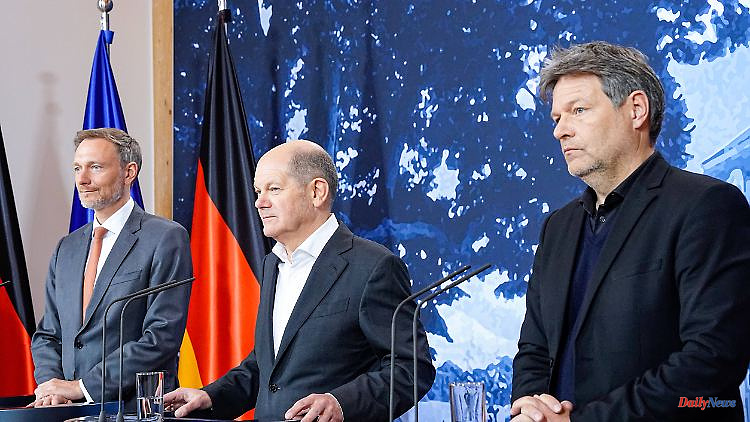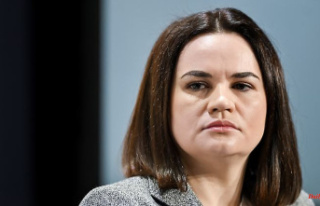The snow from Meseberg near Berlin swallowed every discordant note that could have crept into the cabinet meeting and the final press conference of Scholz, Habeck and Lindner. But it will melt.
One would like to believe them, Messrs. Lindner, Scholz and Habeck, as they spread a message of harmony and confidence there at Meseberg Castle. While a delicate winter landscape lures outside, they demonstrate heart-warming harmony and confidence on the inside this afternoon. Chancellor Olaf Scholz speaks of a "very good cabinet meeting" that was "very constructive" and "informative". Economy Minister Robert Habeck says the castle's seclusion made it clear "what a privilege it is to be in a federal government". Finance Minister Christian Lindner says that even at such a closed conference, "in informal talks", one or the other can be clarified. That helps to "broaden perspective".
The chancellor and minister had gathered for around 24 hours on the property, almost 70 kilometers north of Berlin's government district. EU Commission President Ursula von der Leyen also flew in. She wanted to get one of the most stubborn cows off the ice, namely the dispute over the ban on combustion engines in the EU from 2035. The FDP and, above all, its Minister of Transport, Volker Wissing, want to ensure that cars with combustion engines will still be allowed after that, if only with drive climate-neutral e-fuels.
This is exactly one of the chunks that had dragged down the mood before this retreat. The Greens and large parts of the EU banged their foreheads last week when Wissing announced that it would not agree to the planned ban after all. The topic was actually long overdue at EU level. The last decision on Tuesday was, according to what is customary in Brussels, a formality. But then Wissing pulled the emergency brake. Demanded that the EU Commission make a proposal on e-fuels.
At the press conference in Meseberg, the smiles on all three traffic light heads seemed to be a bit more tormented when a question was asked about them. Scholz answers first. The federal government is in agreement that the EU Commission will make a proposal "aimed at" how e-fuels could be used after 2035, he says. That was made "politically effective" a year ago, it's about nothing new. Lindner picks this up: In the 2021 exploratory paper, the FDP made it clear how important it was to be open to technology. In other words: that the door for cars with combustion engines must remain at least a crack open. At the moment there is no legal security, and if there is, "everything will continue its course". And Habeck? silent.
According to the traffic light, there is also nothing new on other controversial issues such as budget planning, basic child security or the consequences of the US subsidy program Inflation Reduction Act. You could also say: You haven't gotten a step further. In Meseberg, the three coalition partners wanted to avoid what could look like a coalition crash anyway. Instead, Scholz speaks of a "noticeable undercut". A video snippet that was circulating on social media also conveyed a good mood. It shows the chancellor forming a snowball outside. He threw it, but as befits a chancellor, "at no one," as he says with a half-cheeked smile.
The permanent row in the coalition is simply ignored. The Chancellor prefers to speak of the "speed and confidence" that is needed to make the economy climate-neutral. Much had been achieved in the first year in office to "steer our country through the crisis". This created a "swing for our country". Now wind power and solar energy would have to be expanded at an unimagined pace - with a clear shortage of skilled workers. Scholz turns that into a positive: Germany will leave the problems of unemployment behind. "We must and we want to dare more progress," says Scholz. That is also a commitment to this traffic light, because that was exactly the title of the coalition agreement.
"Speed and confidence", that's what Scholz could recommend to his own coalition. 30 laws are currently stuck in traffic lights, so to speak, because the coalition partners cannot agree. It feels like a topic is added every week, be it a possible ban on advertising sweets or the ban on newly installed gas heaters. And the next debate about nuclear power plants is sure to come.
Will this spirit of Meseberg, which Scholz, Habeck and Lindner conjure up, make it back to Berlin? At the last coalition retreat at Schloss Meseberg, at the end of August 2022, there had previously been reports of disputes in the cabinet. Back then, too, Lindner, Habeck and Scholz struggled to create a picture of unity. It didn't get any better.
Discussions will continue in Berlin. About how long the traffic light will stay together. About the fact that she no longer has a majority in polls. About the fact that the FDP has apparently decided to make opposition in the coalition - presumably because one state election after the other has been lost. About the fact that the Greens and the FDP are crossed because some want to invest massively in climate protection and the energy transition and the other is meticulous about ensuring that the debt brake is adhered to.
The snow from Meseberg only covers up this basic conflict. But it will soon melt away.












